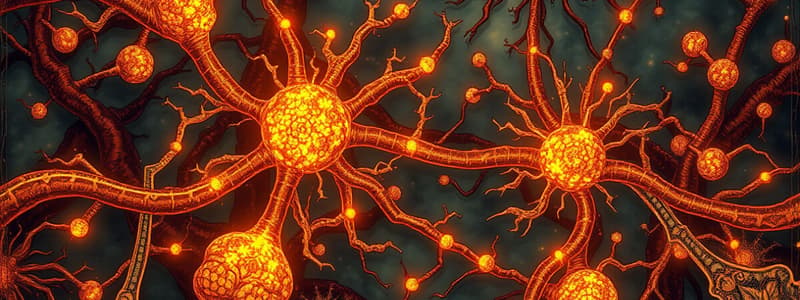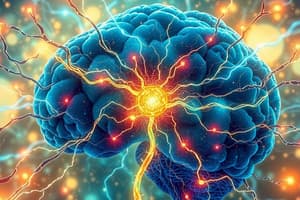Podcast
Questions and Answers
What is the primary role of synaptic integration in a postsynaptic neuron?
What is the primary role of synaptic integration in a postsynaptic neuron?
- To combine multiple synaptic potentials (correct)
- To isolate synaptic inputs for processing
- To completely block synaptic signals
- To amplify individual synaptic inputs
How do neurons typically evaluate synaptic inputs over time?
How do neurons typically evaluate synaptic inputs over time?
- By prioritizing inputs from specific neurons
- By using weighted voting of all recent inputs (correct)
- By averaging all inputs equally
- By focusing on the most recent input
What unit is generally released during synaptic transmission?
What unit is generally released during synaptic transmission?
- Action potential
- Miniature postsynaptic potential
- Neurotransmitter molecule
- Synaptic vesicle (quantum) (correct)
What is the outcome when multiple miniature EPSPs accumulate?
What is the outcome when multiple miniature EPSPs accumulate?
What does quantal analysis help determine during neurotransmission?
What does quantal analysis help determine during neurotransmission?
What initiates the exocytosis process for neurotransmitter release?
What initiates the exocytosis process for neurotransmitter release?
Which category does glutamate belong to?
Which category does glutamate belong to?
What effect does a ligand-gated ion channel receptor elicit on the postsynaptic cell?
What effect does a ligand-gated ion channel receptor elicit on the postsynaptic cell?
What is the outcome of an excitatory post-synaptic potential (EPSP)?
What is the outcome of an excitatory post-synaptic potential (EPSP)?
How do G protein-coupled receptors differ from ligand-gated ion channels?
How do G protein-coupled receptors differ from ligand-gated ion channels?
What process retrieves vesicle membrane after neurotransmitter release?
What process retrieves vesicle membrane after neurotransmitter release?
Which of the following neurotransmitters is classified as a peptide?
Which of the following neurotransmitters is classified as a peptide?
What characterizes inhibitory post-synaptic potential (IPSP)?
What characterizes inhibitory post-synaptic potential (IPSP)?
Which of the following neurotransmitters is an amine?
Which of the following neurotransmitters is an amine?
How do neurotransmitter receptors affect synaptic transmission?
How do neurotransmitter receptors affect synaptic transmission?
What is the primary function of synapses in the nervous system?
What is the primary function of synapses in the nervous system?
Which type of synapse is directly characterized by the flow of ions between cells?
Which type of synapse is directly characterized by the flow of ions between cells?
What separates the pre-synaptic and post-synaptic neurons in chemical synapses?
What separates the pre-synaptic and post-synaptic neurons in chemical synapses?
What does the term 'connexon' refer to in the context of electrical synapses?
What does the term 'connexon' refer to in the context of electrical synapses?
Which of the following categories of synapses is considered the most common in the nervous system?
Which of the following categories of synapses is considered the most common in the nervous system?
In chemical synapses, neurotransmitters are released from which part of the neuron?
In chemical synapses, neurotransmitters are released from which part of the neuron?
What type of synapse allows for bidirectional flow of ions?
What type of synapse allows for bidirectional flow of ions?
How did Otto Loewi contribute to our understanding of synaptic transmission?
How did Otto Loewi contribute to our understanding of synaptic transmission?
What occurs at the postsynaptic neuronal membrane after neurotransmitter release?
What occurs at the postsynaptic neuronal membrane after neurotransmitter release?
Which anatomical connection is characterized as axon to axon?
Which anatomical connection is characterized as axon to axon?
What is the primary function of autoreceptors in the presynaptic axon terminal?
What is the primary function of autoreceptors in the presynaptic axon terminal?
What phenomenon describes the summation of postsynaptic potentials?
What phenomenon describes the summation of postsynaptic potentials?
Which mechanism involves the reentry of neurotransmitter molecules back into the presynaptic axon terminal?
Which mechanism involves the reentry of neurotransmitter molecules back into the presynaptic axon terminal?
What effect do selective serotonin reuptake inhibitors (SSRIs) have on neurotransmitter activity?
What effect do selective serotonin reuptake inhibitors (SSRIs) have on neurotransmitter activity?
What is the general directionality of information flow at a synapse?
What is the general directionality of information flow at a synapse?
What type of drug acts as a receptor antagonist?
What type of drug acts as a receptor antagonist?
Studies on the neuromuscular junction primarily advanced our understanding of what?
Studies on the neuromuscular junction primarily advanced our understanding of what?
Which synaptic connection occurs from dendrite to dendrite?
Which synaptic connection occurs from dendrite to dendrite?
What process involves the breakdown of neurotransmitters in the synaptic cleft or terminal cytosol?
What process involves the breakdown of neurotransmitters in the synaptic cleft or terminal cytosol?
What role do G protein-coupled receptors play in neuronal signaling?
What role do G protein-coupled receptors play in neuronal signaling?
What is neuropharmacology primarily concerned with?
What is neuropharmacology primarily concerned with?
What is a common consequence of neurotransmitter receptor desensitization?
What is a common consequence of neurotransmitter receptor desensitization?
What is the primary function of EPSP summation in neurons?
What is the primary function of EPSP summation in neurons?
What distinguishes spatial summation from temporal summation?
What distinguishes spatial summation from temporal summation?
How do dendrites function in synaptic integration?
How do dendrites function in synaptic integration?
What effect do inhibitory synapses have on membrane potential?
What effect do inhibitory synapses have on membrane potential?
What is a key feature of dendritic structure regarding signal transmission?
What is a key feature of dendritic structure regarding signal transmission?
What type of channels can many dendrites possess to modulate postsynaptic potentials?
What type of channels can many dendrites possess to modulate postsynaptic potentials?
Which of the following correctly describes the role of dendrites in synaptic integration?
Which of the following correctly describes the role of dendrites in synaptic integration?
Which statement about inhibitory synapses is true?
Which statement about inhibitory synapses is true?
Flashcards are hidden until you start studying
Study Notes
Synaptic Transmission Overview
- Synaptic transmission facilitates information transfer between neurons at a synapse, resembling a service network for message delivery.
- Coined "synapse" by Charles Sherrington in 1897, crucial for nervous system functions.
- Chemical synapses were first demonstrated by Otto Loewi in 1921, while electrical synapses were identified in the late 1950s by Furshpan and Potter.
Types of Synapses
- Chemical Synapses: Most prevalent, requiring neurotransmitter release across the synaptic cleft, converting chemical signals to electrical ones.
- Electrical Synapses: Fast and bidirectional, formed by gap junctions allowing direct ion flow between connected neurons.
Anatomical Connections
- Types of synaptic connections include:
- Axodendritic: From axon to dendrite
- Axosomatic: From axon to cell body
- Axoaxonic: From axon to axon
- Axospinous: From axon to dendritic spine
- Dendrodendritic: From dendrite to dendrite
Neurotransmitter Release
- Triggered by intracellular calcium levels, leading to exocytosis where neurotransmitters are released into the synaptic cleft.
- Vesicle membranes are then recovered through endocytosis.
Categories of Neurotransmitters
- Amino Acids: e.g., glutamate, glycine, GABA
- Amines: e.g., dopamine, acetylcholine, histamine
- Peptides: Short amino acid chains like dynorphin and enkephalins
Effects of Neurotransmitters
- Specific receptors on postsynaptic membranes determine the effects:
- Ligand-Gated Ion Channels: Can produce excitatory (EPSP) or inhibitory (IPSP) postsynaptic potentials.
- EPSP results in membrane depolarization.
- IPSP results in membrane hyperpolarization.
- G Protein-Coupled Receptors: Involved in more complex, long-term changes related to neuroplasticity.
- Ligand-Gated Ion Channels: Can produce excitatory (EPSP) or inhibitory (IPSP) postsynaptic potentials.
Autoreceptors and Neurotransmitter Clearance
- Autoreceptors: Located on presynaptic membranes, sensitive to the released neurotransmitter, often inhibiting further release.
- Neurotransmitter removal methods:
- Diffusion away from the synapse
- Reuptake into the presynaptic terminal
- Enzymatic destruction (e.g., AChE cleaves acetylcholine)
- Desensitization can occur, affecting response duration.
Neuropharmacology
- Focuses on drug impacts on the nervous system, including:
- Antagonists: Inhibit neurotransmitter receptors (e.g., curare).
- Agonists: Mimic effects of neurotransmitters (e.g., nicotine).
- Defective neurotransmission linked to various neurological and psychiatric disorders.
Synaptic Integration
- Involves the summation of multiple synaptic potentials within a postsynaptic neuron, determining the cumulative effect over time.
- Neurons receive thousands of inputs, using a "weighted voting" system for decision-making.
- Quantal Release: Release of a fixed number of vesicles results in measurable changes in postsynaptic potential (minis to full EPSPs).
Summation Techniques
- Spatial Summation: Simultaneous activation of multiple synapses.
- Temporal Summation: Rapid succession activation at the same synapse.
Dendritic Involvement
- Dendrites are critical in synaptic integration, acting as conduits for postsynaptic potentials.
- Depolarization diminishes with distance along dendrites; however, structural complexity enhances processing capabilities.
- Dendrites may contain voltage-gated channels, allowing active signal amplification.
Inhibitory Synapses
- Play a vital role in controlling neuronal output, moving the membrane potential away from action potential thresholds, critical for overall neural balance.
Studying That Suits You
Use AI to generate personalized quizzes and flashcards to suit your learning preferences.




